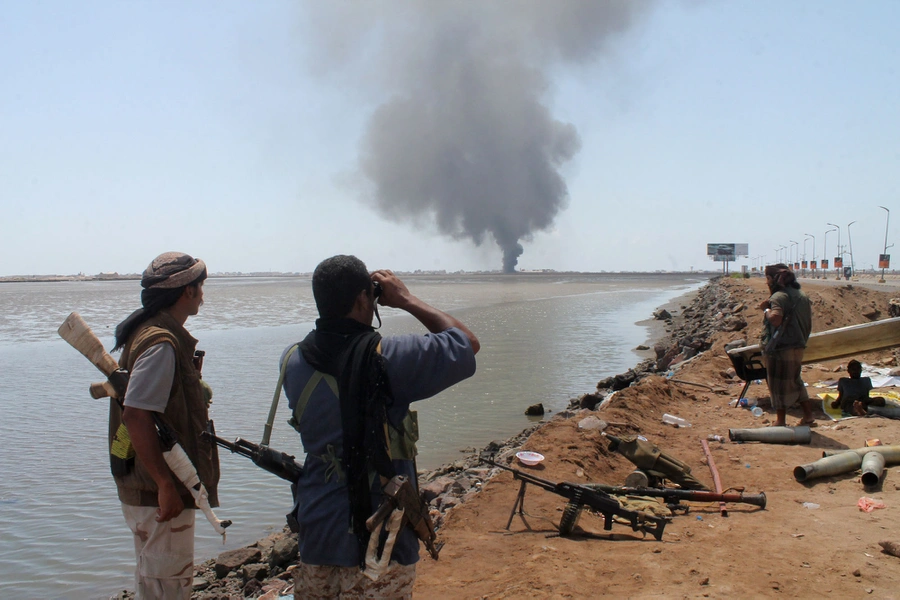
An estimated 10,000 Sri Lankan Seafarers are currently on the line of fire in the Red Sea following escalating and deadly attacks on merchant and other vessels by Iranian-backed Houthi rebels, officials with the industry said yesterday.
The exact number of active Sri Lankan Seafarers currently embedded on foreign flagged merchant vessels cannot be reached but the officials said it anything between 15, 000 to 20,000.
The bulk of the Sri Lankans are employed on vessels that must sail to and from the Red Sea and there is no way out should they be caught up in hostilities while in that region, the officials said.
Sri Lanka at present does not own a single merchant vessel and all the Lankans are on board foreign vessels and they could be Israeli owned or otherwise, they said.
Director General of Merchant Shipping Ajith Wijesinghe says the present scenario is not that scary, but the situation could change if the war intensifies in the region.
“As of now we have not received a single complaint from the Sri Lankan Seafarers from the Red Sea or otherwise.
Furthermore, Sri Lankans seafarers opting to board foreign vessels cannot be prevented simply because they are doing it at their own risk. Not only that apart from their stipulated salary they will also receive a risk allowance”, Wijesinghe said.
“On our part we have not banned the future recruitment of Sri Lankan Seafarers because apart from the Red Sea there are routes such as the Cape of Good Hope where now major shipping companies have opted to take”.
He said that there has been no significant drop of Sri Lankan Seafarer hopefuls despite the escalating situation in the Red Sea and other areas.
An average Sri Lankan Seafarer at the lowest ranking earns something like US$ 1,200 that could reach up to even US$ 15,000 at the highest officer level, maritime sources said.
“Therefore, the temptation is great war or otherwise”, he added.
The Houthi rebels who armed with sophisticated arsenal that include missiles, explosives packed drones and even fixed wing aircraft supplied by Iran are capable of launching bloody strikes at any moment, the officials explained.
They said that over the past several weeks the Houthis have launched some 23 missile strikes at foreign war ships but they we neutralized mid-air and fell harmlessly into the sea.
The Houthis maintain that the attacks on maritime traffic in the Red Sea is aimed to stop the ongoing Israel bombings on the Gaza Strip, a threat the Jewish State has kept on mute mode.
However, having said that it is only a matter of time that one stray missile could breach the air defenses of the war ship at land on a neutral merchant vessel and cause devastating effects, the officials warned.
The Houthis claim that there are only targeting vessels of Israel ownership or of Jewish interest, but the recent attacks show otherwise.
Sri Lankan for its parts can very little but has decided to deploy two naval ships to the Red Sea to join a coalition of other vessels that would for a coalition known as the ‘Prosperative Guardiance’.
“We have no intention of engaging the Houthis, Iranians, Palestinians, Israelis or other armed actors on the conflict but instead to protect the merchant ships that will be using Red Sea and the Gulf of Eden on their way to Sri Lanka.
“Besides it is also a part of an international obligation to protect maritime traffic in difficult times such as this and therefore it is imperative to join the international coalition” Sri Lanka Navy Spokesman said.
“All the ground preparations are ready for deployment, but we are waiting for the exact date to set sail for the Red Sea.
At the moment extensive discussions are being held with all the coalition partners prior to the deployment on the Red Sea.
He said a large number of merchant ships also carry heavily armed Sea Marshalls but this mainly to thwart Somali pirates who are known to roam the seas in the areas.
“However these Sea Marshalls equipped with only small arms weapons would be no match to drones, missiles and other objectives fired by the Houthis.
Moreover this will also be the first time that Sri Lanka will be deployed in the Red Sea even though it will be of a minor combat role.
For his part President Ranil Wickremesenghe has repeatedly ordered the Sri Lankan naval authorities to deploy warships into the area stressing it was important to protect the international maritime trade that otherwise will have repercussions on the Sri Lankan ports as well.
The President also said that this was the first time that ships are being sent from Sri Lanka to protect international waters after the reign of King Parakramabahau the Great.
“If we fail to send the ships to the Red Sea looking in to the cost factor then the country will have to bear huge cost due to the non arrival of merchant ships into the country.
President Wickremesinghe said that Sri Lankan war ships are sent into the Red Sea to provide security for cargo ships travelling along the merchant trade routes and not support wars between any states.
According to maritime sources major ship owners in the world have already skipped the Red Sea route and opted to navigate around the Cape of Good Hope, a timely and expenditure voyage that will see commodities skyrocket throughout the world.
Meanwhile, according to Agencies reports, President Joe Biden said Thursday that a series of strikes in Yemen targeting Iran-backed Houthi rebels was meant to demonstrate that the U.S. and its allies “will not tolerate” the militant group’s ceaseless attacks on the Red Sea
Biden said the U.S. and its allies only made the move after attempts at diplomatic negotiations and careful deliberation.
“These strikes are in direct response to unprecedented Houthi attacks against international maritime vessels in the Red Sea — including the use of anti-ship ballistic missiles for the first time in history,” Biden said in a statement. “These attacks have endangered U.S. personnel, civilian mariners, and our partners, jeopardized trade, and threatened freedom of navigation.”
Biden said the U.S. and its allies only made the move after attempts at diplomatic negotiations and careful deliberation.
“These strikes are in direct response to unprecedented Houthi attacks against international maritime vessels in the Red Sea — including the use of anti-ship ballistic missiles for the first time in history,” Biden said in a statement. “These attacks have endangered U.S. personnel, civilian mariners, and our partners, jeopardized trade, and threatened freedom of navigation.”







